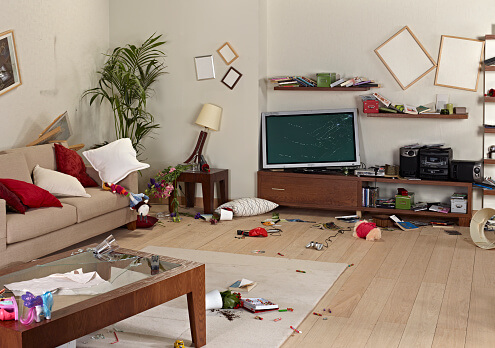
14 Causes Why Someone Would Not Clean Their House
Cleaners Talk is reader-supported. This post contains affiliate links, we may earn a commission at no additional costs to you. As an Amazon Associate we earn from qualifying purchases.
Many different reasons would cause someone not to clean their house.
For example, some people might be too busy with school, work, or other commitments and don't have the time for cleaning. Others may feel like they can't clean because of a disability such as arthritis which means it would be difficult to use heavy objects and scrub floors.
Finally, some people may not want to spend money on products and materials needed for cleaning. Instead, they buy new furniture or appliances, which seems more worthwhile than cleaning supplies.
No matter why someone chooses not to clean their house, there is always something that needs to be cleaned to remain livable; no one wants food crumbs all over the floor or a sink full of dirty dishes when they have guests over. To find out what causes someone not to clean their house, continue reading.
1. Not Having Time for Cleaning

Let's face it. People are busy. There is little time to clean between school, work, and extracurricular activities.
Suppose you start work at 6:00 AM and don't get off until 5:00 PM, or you go to school from 8:00 AM to 3:00 PM and participate in two extracurricular activities or have a part-time job after school.
That leaves you with only a few hours of free time every day, which hardly gives anyone enough time for cleaning. Not having time for cleaning is just one of the reasons that people may not clean their house.
In addition, someone might not have enough time for cleaning if they have a lot of commitments outside of school or work. For example, you may have an elderly parent who needs help taking care of their house, so you volunteer to do it for them because they can't do it on their own anymore.
If this is the case, you might not have enough time to clean your house.
2. Having a Disability that Prevents Cleaning
Not everyone has the same abilities, which means some may struggle to clean their house due to a disability such as arthritis. Arthritis is an inflammation of joints that can make it challenging to use their hands and fingers properly. It can also cause fatigue, stiffness, and pain in the joints, making it difficult for someone to stand or sit still long enough for a thorough cleaning.
Arthritis isn't the only disability that would prevent cleaning. For example, some people have a disability that prevents them from lifting objects. As a result, these people may not lift heavy vacuum cleaners or scrub the floors with a brush and bleach solution on their hands and knees.
In addition, if they can't bend over quickly, they might not clean the ceilings of rooms properly because it requires reaching high above your head while standing on something such as a small ladder or footstool.
3. Not Wanting to Spend Money for Cleaning Supplies
For some, there is a more practical reason why they don't want to spend money on cleaning supplies: either because they're "cheap," financially responsible, don't see why you would need things like sponges when paper towels are cheaper, etc. If you enjoy saving money, you might be one of the people who doesn't want to spend money on cleaning supplies.
However, it can eventually become a burden for those who choose not to buy cleaning supplies because they may have to replace household items such as furniture and appliances more frequently than others.
For example, if a person has a spill from juice from an orange that dries into a sticky mess on their white carpeting, they would have to shampoo or steam clean that carpet area.
In addition, if they don't clean off the spots properly with an all-purpose cleaner and water solution after removing any excess liquid from the carpeting with paper towels or rags, they may notice those stains reappear later. Cleaning your house takes time and money, so it's best to keep up with both effectively.
4. Having a Messy Lifestyle
Some people have messy lifestyles. For example, they might be forgetful and leave water rings on their coffee table from glasses filled with liquids or eat foods such as “smores” that get all over their hands and fingers, which results in crumbs between the cushions of couches and chairs if they don't wipe them off after eating.
Likewise, those who enjoy watching TV, playing video games, or using their computers for several hours at a time without getting up to use the restroom may end up leaving piles of dishes by the sink instead of rinsing them off after each meal because it seems easier to let them build up.
5. Living in a Poorly Constructed House
If someone lives in a poorly constructed house, it could affect their cleaning habits because there may be cracks or crevices where dust bunnies can hide and create distractions.
They also might not open windows without an obstructed view outside due to construction flaws.
It can result in foul odors that are difficult to eliminate with just sprays or candles, especially if the smell is coming from food that has gone stale or one of the pets has an accident on the carpeting during potty training. Additionally, if they're unable to open windows for fresh air, germs could become trapped inside their house because airflow isn't circulating.
6. Living with Pets

Having some pets, such as cats or dogs, can result in missing spots when you're dusting furniture because pet hair gets everywhere. People also have to clean up litter boxes regularly, but sometimes they do it so infrequently that the litter box begins to smell bad if someone forgets to put baking soda into the box and stir the litter around every other day or so with a spoon.
It might affect their cleaning habits even more than having a messy lifestyle.
Not only would they need to use chemicals like bleach and ammonia for their floors and carpets if something has been spilled on them by accident; they'd also have to clean out the litter box before disposing of its contents away from home, or they could continue to use the box until it becomes too smelly.
7. Unwillingness to Change Personal Habits
Some people are unwilling to change their habits, even if they don't want to clean up after themselves or refuse to buy cleaning supplies. They may be comfortable living in a messy house, while others cannot stand the messes they're making because of poor cleaning habits.
Others may feel that since things are "just fine" for them, then there's no need to change anything about what they do regarding how they maintain their home.
That is why some people cannot get rid of clutter problems unless someone else does it for them, resulting in severe conflicts between family members who have different standards for cleanliness and organization.
8. Financial Issues
If someone is unemployed or underemployed, then it's likely that they will struggle to pay their bills.
This could affect how long it takes them to clean up after themselves because they may not have the time or the money to buy the supplies needed for things like scrubbing floors or using all-purpose cleaners to get rid of tough stains on carpets.
Furthermore, if they don't have a washing machine in their home, it might be difficult to adequately clean dirty clothes each week. For some people living in poverty, this issue can even lead to depression, making it more challenging for them to stay motivated about house cleaning tasks when there are so many other things to worry about in life.
9. Stress and Fatigue
If someone is stressed out, it may be difficult for them to focus on cleaning up after themselves.
For example, they may be dealing with many responsibilities and projects at work and might not have the energy to get through each day without feeling like they're overwhelmed by their workload.
If this is the case, then housework will likely fall low on their list of priorities because they'd rather spend time relaxing or doing fun activities than working all day long and coming home to do more chores.
Furthermore, if someone is sick, such as with the flu or a lung infection, they may not get cleaned up in time before meeting friends or going out in public because being ill prevents them from wanting to or doing any other forms of activity.
10. Bad Habits
Even if they agree that it's essential to keep their house clean, some people may have an issue with changing how they do things or adopting new techniques for maintaining their homes. For instance, some people refuse to dust their furniture because they view it as a waste of time and effort.
Still, others can maintain cleanliness in this area because dust is sometimes the sign of a more severe problem like mold or mildew growth somewhere in the home where someone hasn't been cleaning frequently enough.
This issue can apply to anything about housework, including vacuuming carpeted areas, washing dishes by hand instead of placing them into a dishwasher after eating each meal, or preparing food at home rather than eating out at restaurants more often.
11. Emotional Baggage
Someone may struggle with keeping their house clean if they're still dealing with emotional baggage from the past that causes them to feel unmotivated about cleaning up after themselves or making progress in any form of self-improvement.
Some people had parents who did not discipline them for leaving their rooms messy, and they learned from an early age how it's okay to be untidy, so there's nothing wrong with this approach towards life.
However, when someone has a complete mindset of "I don't care" and refuses to change or even try to change, this can affect all areas of how they live their lives, including how clean or dirty their homes are compared to other houses in their neighborhood.
12. Depression and Anxiety

If someone has depression or anxiety, then it may be difficult for them to stick with routines like cleaning up the house every day because they constantly feel sad or worried about things in their lives.
If this is the case, they need to see a doctor about these issues to get professional treatment or diagnosis to determine their condition and what specific treatments could help them.
This way, these feelings won't continue to cause problems for this individual regularly and make it harder for them to maintain good physical health throughout their lifetime.
13. Personal Hygiene Preferences
Some people may not care about keeping themselves clean if they don't value personal hygiene. They may not like to shower daily, or they might only change their clothes once per week if this is all the time that they need to feel fresh and clean enough for public appearances, such as at work.
Another example would be someone who prefers to wear their shoes inside their house. While it is normal for them, some people may wonder why they do not leave their footwear outside. After all, it is their house, so they make their own rules.
If someone is struggling with depression or anxiety, then it will be difficult for them to shower regularly because of how dark their mood feels most days of the week.
Others might refuse to clean themselves throughout the day because they're either too depressed or too busy focusing on other things in life that are causing more stress than getting regular exercise and bathing every few days would help keep these issues under control.
14. Lack of Information
Some people who never learned how to clean their house correctly may struggle with this if they didn't have parents or other family members growing up that could teach them what needs to be done and in what order the chores need to be taken care of.
Also, if someone is struggling with depression, it might be difficult for them to learn new information about cleaning because they'd rather stay inside playing video games or watching TV all day instead.
As long as someone has enough money for food and shelter, then personal hygiene and cleaning will not always seem like a priority in life, making anyone feel negatively towards themselves and others due to how dirty their home looks compared to those around them.
If you have someone who's house is a mess, you may want to learn how to tell them to clean their house the right way. Sometimes, all they need are positive words and the encouragement of someone else.
Conclusion
There are a variety of reasons why someone might not clean their house. It can be challenging to determine the root cause if more than one factor is involved, but it's also essential to remember that these issues may not even be due to anything going on with this person.
For example, a caregiver or close family member could have been responsible for teaching them how to clean up after themselves. If this isn't happening, then they're going to need help from other people in their life who want them to succeed and stay motivated about keeping their home organized and tidy instead of cluttered with garbage all day long.
